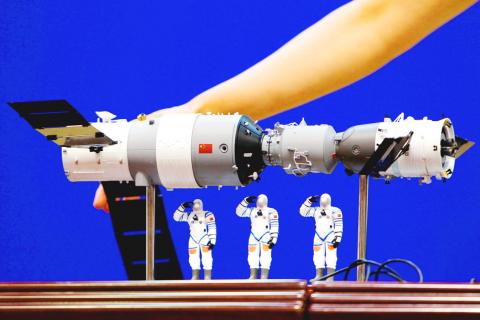An out-of-control space laboratory that is to plunge back to Earth in the coming days is unlikely to cause any damage, Chinese authorities said, but would offer instead a “splendid” show akin to a meteor shower.
China’s space agency on Thursday said that the nearly 8-tonne Tiangong-1 would re-enter the atmosphere some time between today and Monday.
The European Space Agency (ESA) has a smaller window between midday today and early tomorrow afternoon GMT.

Photo: Reuters
However, there is “no need for people to worry,” the China Manned Space Engineering Office (CMSEO) said on its WeChat social media account.
Such falling spacecraft do “not crash into the Earth fiercely like in sci-fi movies, but turn into a splendid [meteor shower] and move across the beautiful starry sky as they race toward the Earth,” it said.
The lab was placed in orbit in September 2011 and had been slated for a controlled re-entry, but it ceased functioning in March 2016 and space enthusiasts have been bracing for its fiery return.
Beijing sees its multibillion-dollar space program as a symbol of the nation’s rise.
It has plans to send a manned mission to the moon.
China sent another laboratory into orbit, the Tiangong-2, in September 2016 and hopes to turn it into a crewed space station by 2022.
Experts have downplayed any concerns about the Tiangong-1 causing any damage when it hurtles back to Earth, with the ESA saying that nearly 6,000 uncontrolled re-entries of large objects have occurred over the past 60 years without harming anyone.
The CMSEO said the probability of someone being hit by a meteorite of more than 200g is 1 in 700 million.
During the uncontrolled re-entry, atmospheric drag would rip away solar arrays, antennas and other external components at an altitude of about 100km, the CMSEO said.
The intensifying heat and friction would cause the main structure to burn or blow up and it should disintegrate at an altitude of about 80km, it said.
Most fragments would dissipate in the air and a small amount of debris would fall relatively slowly before landing, most likely in the ocean, which covers more than 70 percent of the Earth’s surface.
Jonathan McDowell, an astronomer at the Harvard-Smithsonian Center for Astrophysics, estimated that the lab is the 50th-biggest uncontrolled re-entry of an object since 1957.
“Much bigger things have come down with no casualties,” McDowell said.
“This thing is like a small plane crash,” he said, adding that the trail of debris would scatter pieces several hundred kilometers apart.
At an altitude of 60km to 70km, debris would begin to turn into “a series of fireballs,” which is when people on the ground would “see a spectacular show,” he said.
China plans to step up efforts to coordinate with the UN Office for Outer Space Affairs as the re-entry nears, Chinese Ministry of Foreign Affairs spokesman Lu Kang (陸慷) told reporters yesterday.
“I want to highlight that we attach importance to this issue, and we’ve been dealing with it very responsibly in accordance with relevant laws and regulations,” Lu said. “What I’ve heard is the possibility of large amounts of debris falling to the ground is very slim.”

DEFENDING DEMOCRACY: Taiwan shares the same values as those that fought in WWII, and nations must unite to halt the expansion of a new authoritarian bloc, Lai said The government yesterday held a commemoration ceremony for Victory in Europe (V-E) Day, joining the rest of the world for the first time to mark the anniversary of the end of World War II in Europe. Taiwan honoring V-E Day signifies “our growing connections with the international community,” President William Lai (賴清德) said at a reception in Taipei on the 80th anniversary of V-E Day. One of the major lessons of World War II is that “authoritarianism and aggression lead only to slaughter, tragedy and greater inequality,” Lai said. Even more importantly, the war also taught people that “those who cherish peace cannot

STEADFAST FRIEND: The bills encourage increased Taiwan-US engagement and address China’s distortion of UN Resolution 2758 to isolate Taiwan internationally The Presidential Office yesterday thanked the US House of Representatives for unanimously passing two Taiwan-related bills highlighting its solid support for Taiwan’s democracy and global participation, and for deepening bilateral relations. One of the bills, the Taiwan Assurance Implementation Act, requires the US Department of State to periodically review its guidelines for engagement with Taiwan, and report to the US Congress on the guidelines and plans to lift self-imposed limitations on US-Taiwan engagement. The other bill is the Taiwan International Solidarity Act, which clarifies that UN Resolution 2758 does not address the issue of the representation of Taiwan or its people in

Taiwanese Olympic badminton men’s doubles gold medalist Wang Chi-lin (王齊麟) and his new partner, Chiu Hsiang-chieh (邱相榤), clinched the men’s doubles title at the Yonex Taipei Open yesterday, becoming the second Taiwanese team to win a title in the tournament. Ranked 19th in the world, the Taiwanese duo defeated Kang Min-hyuk and Ki Dong-ju of South Korea 21-18, 21-15 in a pulsating 43-minute final to clinch their first doubles title after teaming up last year. Wang, the men’s doubles gold medalist at the 2020 and 2024 Olympics, partnered with Chiu in August last year after the retirement of his teammate Lee Yang

The Philippines yesterday criticized a “high-risk” maneuver by a Chinese vessel near the disputed Scarborough Shoal (Huangyan Island, 黃岩島) in a rare incident involving warships from the two navies. The Scarborough Shoal — a triangular chain of reefs and rocks in the contested South China Sea — has been a flash point between the countries since China seized it from the Philippines in 2012. Taiwan also claims the shoal. Monday’s encounter took place approximately 11.8 nautical miles (22km) southeast” of the Scarborough Shoal, the Philippine military said, during ongoing US-Philippine military exercises that Beijing has criticized as destabilizing. “The Chinese frigate BN 554 was